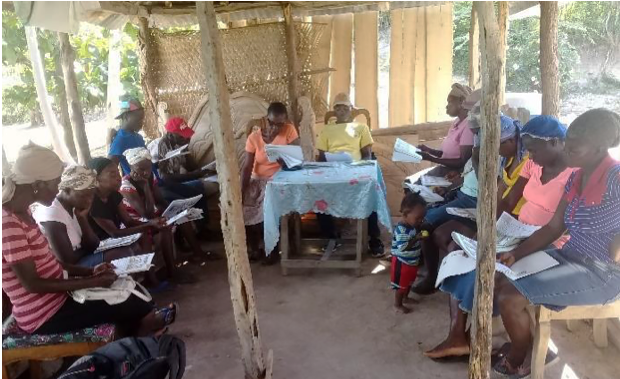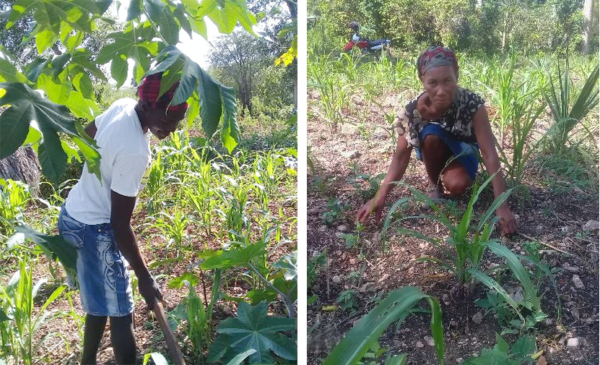
Improving Food Security and the Treatment of Children in Haiti
Local partner SKDE works with 10 farmer cooperatives in Haiti’s Northwest and Artibonite departments. Although hundreds of program participants take part in a wide range of trainings, this report focuses on two.
Improving the Lives of Children
Poor families often have no alternative to sending their children to live with less-poor relatives, with the understanding the children will help with household chores in exchange for food, shelter, and an education. However, this “restavek” or “stay with” system can lead to gross mistreatment, including physical, emotional and sexual abuse. It meets the criteria for child trafficking and modern-day slavery. 25% of Haitian children (300-400,000) live away from their parents. The restavek system is still prevalent in these areas, with many children being used as restavek children and many families having restavek children living with them.
One participant in the training told of her own childhood as a restavek. “I lived with an aunt who mistreated me. She made me do a lot of heavy work, more than I could physically handle at that age. I swept, mopped, lugged and emptied the chamber pot outdoors and prepared food. She did not enroll me at school. I walked barefoot and only had one dress. They hit me with electric cords if I slept late, but I went to bed later than everyone and woke up before all the other people in the house. They called me ugly names, saying, ‘Dirty child, you will never be anything in your life.’ For those reasons, I will never send my child to live with anyone else.”
The co-op members learned about children’s rights, proper treatment of children in their care, and the consequences of violence and domestic servitude a child’s future and society in general. The training has opened their eyes and hearts to the heartbreaking consequences. A woman who has a restavek living with her courageously admitted she was abusing her, and is now treating her as a family member.Rather than having the one girl do all the chores, everyone helps.
Diversified Agricultural Training Improves Families’ Nutrition and Income
The rights of children are intertwined with agricultural support for farmers, who want to ensure their children can attend school, and have access to food, clothing, health care and other basic necessities. Being able to grow food and earn an income means families can keep their children at home, while consciousness-raising on the suffering of restaveks has led to changes in their treatment.
Co-op members are successfully using soil conservation and other sustainable farming techniques to grow more and better-quality food, which improves theirfamily’s nutrition and income. The co-ops hold training sessions on how to prepare ridges in the earth to retain or direct water flow, plant seed beds, make compost and natural insecticide, raise nursery plants, and grow, harvest and market a wider range of vegetables.
 Sonia (at left) a farmer with six household members, participated in trainings on how to improve soil fertility, prepare the land for planting, avoid erosion, and conserve soil moisture during drought. This year she planted beans, corn, pigeon peas, lima beans, sweet potatoes and manioc (tapioca root). She said, “Now I know how to keep the water from taking away my crops. I built barriers using grasses and rocks and I dug channels to direct the water.”
Sonia (at left) a farmer with six household members, participated in trainings on how to improve soil fertility, prepare the land for planting, avoid erosion, and conserve soil moisture during drought. This year she planted beans, corn, pigeon peas, lima beans, sweet potatoes and manioc (tapioca root). She said, “Now I know how to keep the water from taking away my crops. I built barriers using grasses and rocks and I dug channels to direct the water.”
Yvalia (right) ,a widow with 14 children, five still at home, said, “Thanks to the training, I make better use of my land. I used to plant only lima beans and corn. Now, I’ve added peppers, tomatoes and papaya to sell. I’ve learned how to help my crops grow in spite of drought, by using compost, digging channels, adding organic materials to the channels to retain moisture, and planting in those channels.”
Thanks to your support and generosity
• Families grow a greater variety of crops for food and income
• Soil conservation techniques improve crop resiliency to natural and human-made disasters
• Consciousness-raising on the rights of children protects them from abuse
Haiti Northwest Program
Led by Church World Service with Local Partner SKDE
Note: Haiti Northwest will continue as two new programs: Haiti Jean Rabel and Haiti Mole St. Nicolas.
